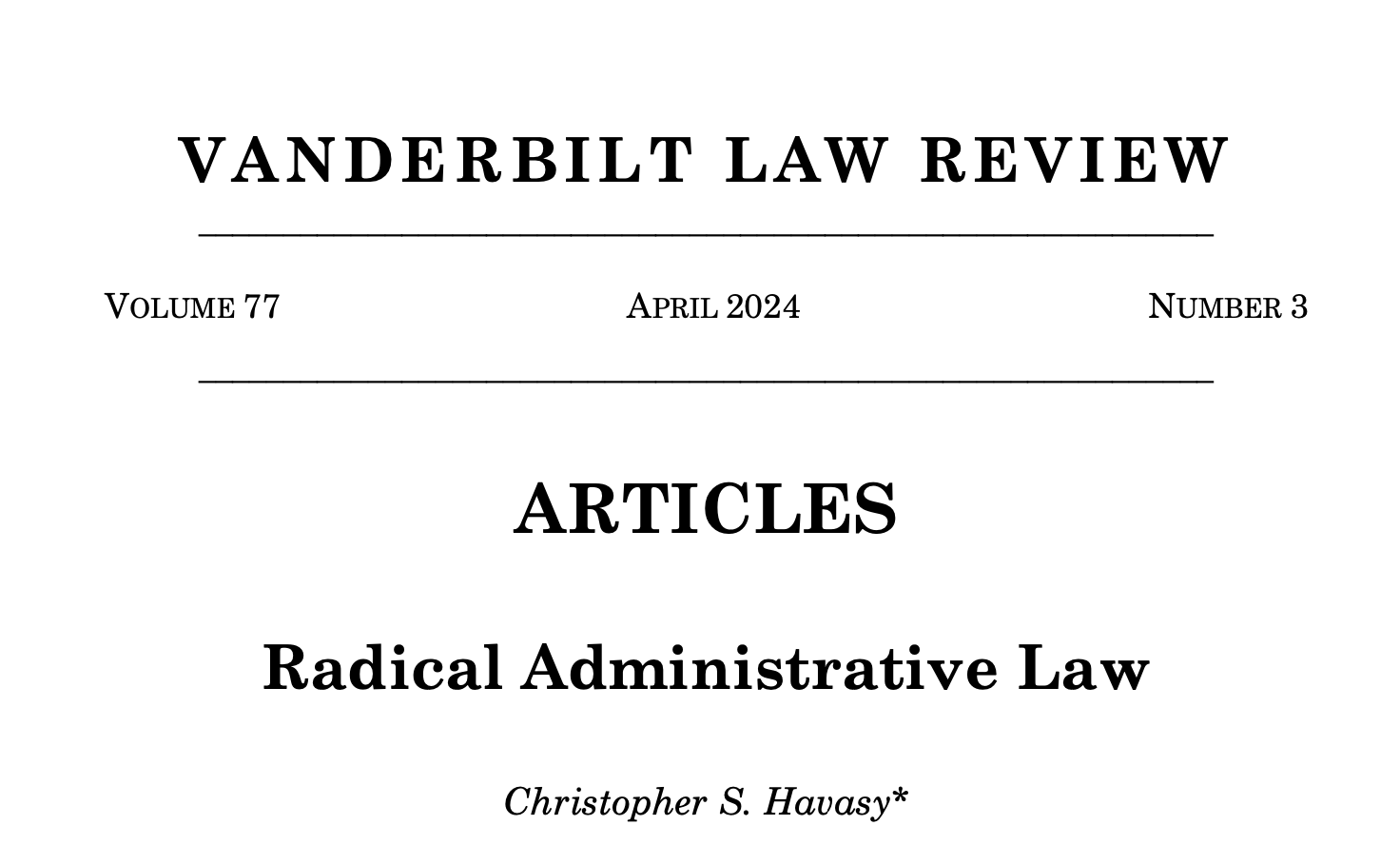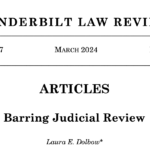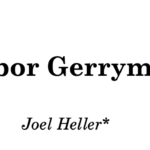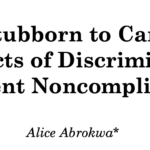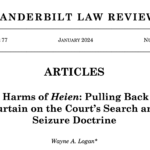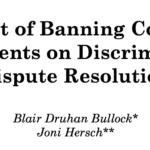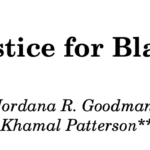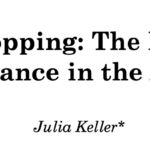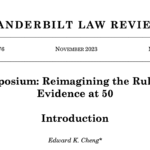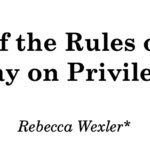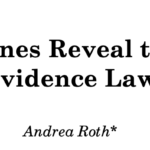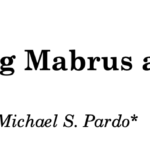Articles Category
Dead Bodies as Quasi-Persons
May. 22, 2024—Ela A. Leshem | 77 Vand. L. Rev. 999 This Article argues that American law treats dead bodies as quasi- persons: entities with a moral status between things and persons. The concept of quasi-personhood builds on dead bodies’ familiar classification as quasi- property. Just as quasi-property implicates only a subset of the rights usually associated...
Anti-Transgender Constitutional Law
May. 22, 2024—Katie Eyer | 77 Vand. L. Rev. 1113 Over the course of the last three decades, gender identity anti- discrimination protections and other transgender-supportive government policies have increased, as government entities have sought to protect and support the transgender community. But constitutional litigation by opponents of transgender equality has also proliferated, seeking to limit or...
Choosing Sides: On the Manipulation of Civil Litigation
May. 22, 2024—Yotam Kaplan & Ittai Paldor | 77 Vand. L. Rev. 1211 Our litigation system is broken. Scholars have long warned that professional litigants, such as debt-collecting firms, insurance companies, and commercial landlords, enjoy immense and unfair advantages over private individuals. What has gone unnoticed is professional litigants’ ability to manipulate their litigatory position—that is, to...
Radical Administrative Law
Apr. 20, 2024—Christopher S. Havasy | 77 Vand. L. Rev. 647 The administrative state is under attack. Judges and scholars increasingly question why agencies should have such large powers to coerce citizens without adequate democratic accountability. Rather than refuting these critics, this Article accepts that in scrutinizing the massive powers that agencies hold over citizens, these critics...
Mass Tort Bankruptcy Goes Public
Apr. 20, 2024—William Organek | 77 Vand. L. Rev. 723 Large companies like 3M, Johnson & Johnson, Purdue Pharma, and others have increasingly, and controversially, turned from multidistrict litigation to bankruptcy to resolve their mass tort liability. While corporate attraction to bankruptcy’s unique features partially explains this evolution, this Article reveals an underexamined driver of this trend...
Barring Judicial Review
Mar. 20, 2024—Laura E. Dolbow | 77 Vand. L. Rev. 307 Whether judicial review is available is one of the most hotly contested issues in administrative law. Recently, laws that prohibit judicial review have sparked debate in the Medicare, immigration, and patent contexts. These debates are continuing in challenges to the recently created Medicare price negotiation program....
The Labor Gerrymander
Mar. 20, 2024—Joel Heller | 77 Vand. L. Rev. 401 The foundational metaphor of federal labor law is “industrial democracy.” But like any good metaphor, it is subject to overuse. The National Labor Relations Act (NLRA) grants employees the right to have a say in the decisions that govern their working lives through union representation and collective...
Too Stubborn to Care for: The Impacts of Discrimination on Patient Noncompliance
Mar. 20, 2024—Alice Abrokwa | 77 Vand. L. Rev. 461 The role of implicit racial biases in police interactions with people of color has garnered increased public attention and scholarly examination over time, but implicit racial bias in the healthcare context can be as deadly, particularly when it intersects with ableism and sexism. Researchers have found that...
The Harms of Heien: Pulling Back the Curtain on the Court’s Search and Seizure Doctrine
Jan. 26, 2024—Wayne A. Logan | 77 Vand. L. Rev. 1 In Heien v. North Carolina, the Supreme Court held that individuals can be seized on the basis of reasonable police mistakes of law. In an opinion authored by Chief Justice Roberts, the eight-Justice majority held that the Fourth Amendment’s prohibition of “unreasonable” seizures does not bar...
The Impact of Banning Confidential Settlements on Discrimination Dispute Resolution
Jan. 26, 2024—Blair Druhan Bullock & Joni Hersch | 77 Vand. L. Rev. 51 The #MeToo movement exposed how workplace harassment plagues employment in the United States. Several states responded by passing legislation aimed at curbing harassment and employment discrimination in the workplace. One of the most common legislative efforts was to ban confidentiality provisions in certain...
Access to Justice for Black Inventors
Jan. 26, 2024—Jordana R. Goodman & Khamal Patterson | 77 Vand. L. Rev. 109 To receive a patent, an inventor must meet certain inventive and procedural standards. Their invention must be novel, nonobvious, and written in such a way that any person skilled in the inventive subject can make and use the invention without undue experimentation. This...
Eavesdropping: The Forgotten Public Nuisance in the Age of Alexa
Jan. 26, 2024—Julia Keller | 77 Vand. L. Rev. 169 Always-listening devices have sparked new concerns about privacy while evading regulation, but a potential solution has existed for hundreds of years: public nuisance. Public nuisance has been stretched to serve as a basis of liability for some of the most prominent cases of modern mass-tort litigation, such...
Introduction
Nov. 27, 2023—Edward K. Cheng | 76 Vand L. Rev. 1603 Prior to the eighteenth century, cartographers would often fill uncharted areas of maps with sea monsters, other artwork, or even rank speculation—a phenomenon labeled “horror vacui,” or fear of empty spaces. For example, in Paolo Forlani’s world map of 1565, a yet- to-be-discovered southern continent was...
Ignorance of the Rules of Omission: An Essay on Privilege Law
Nov. 27, 2023—Rebecca Wexler | 76 Vand. L. Rev. 1609 Alton Logan spent twenty-six years in prison for a murder he did not commit, sleeping with a homemade metal shank under his pillow for protection. Meanwhile, attorney Dale Coventry kept the evidence that would ultimately exonerate Logan—another man’s confession—in a box beneath his bed. Coventry kept the...
How Machines Reveal the Gaps in Evidence Law
Nov. 27, 2023—Andrea Roth | 76 Vand. L. Rev. 1631 This Symposium asks participants to reimagine the Federal Rules of Evidence on the fiftieth anniversary of their effective date. As part of that conversation, this short Essay argues that the Rules of Evidence contain critical gaps in terms of empowering litigants to meaningfully challenge the credibility of...
On Proving Mabrus and Zorgs
Nov. 27, 2023—Michael S. Pardo | 76 Vand. L. Rev. 1653 An unfortunate disconnect exists in modern evidence scholarship. On one hand, a rich literature has explored the process of legal proof in general and legal standards of proof in particular. Call this the “macro level” of legal proof. On the other hand, a rich literature has...



